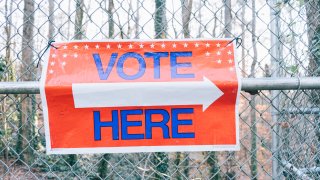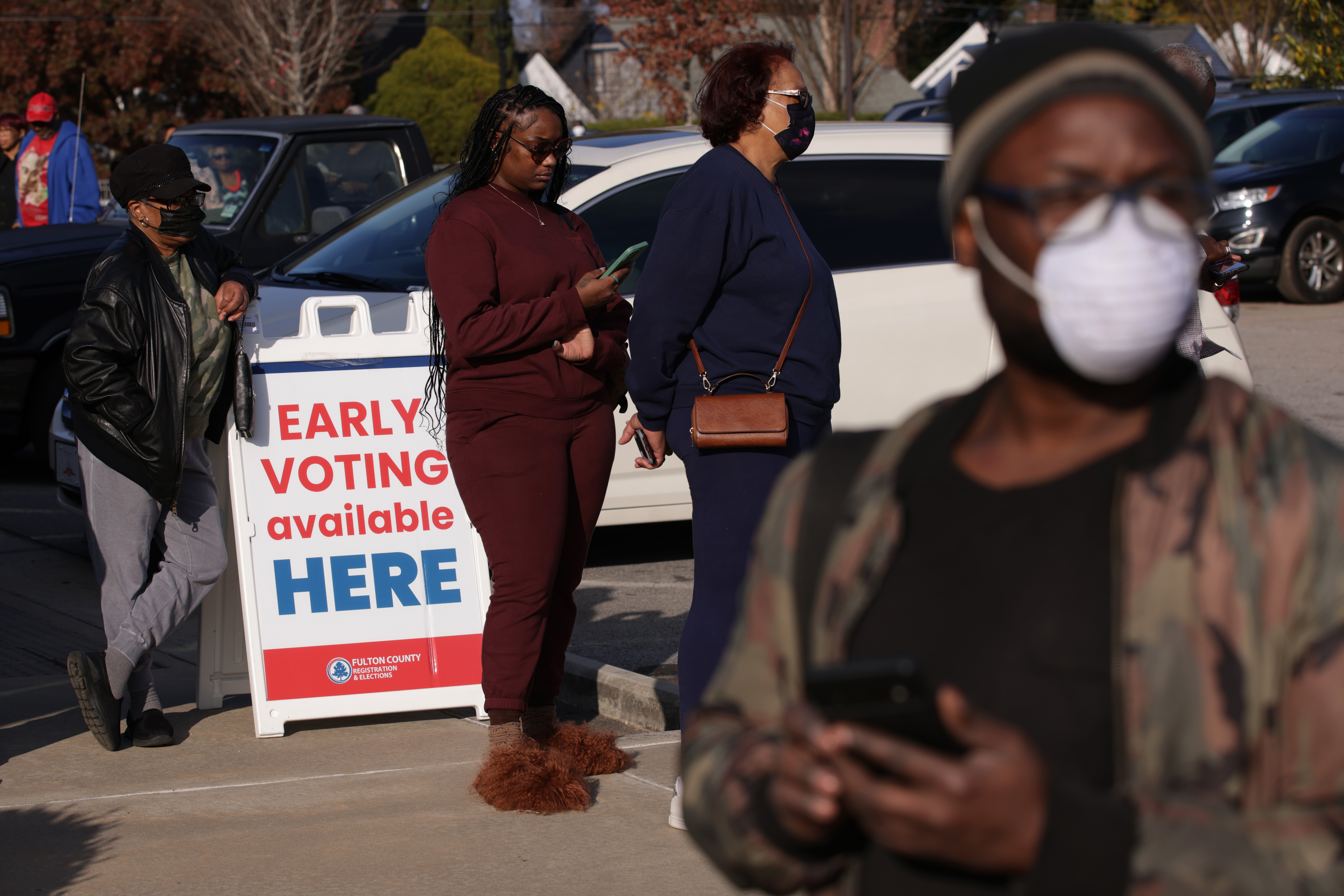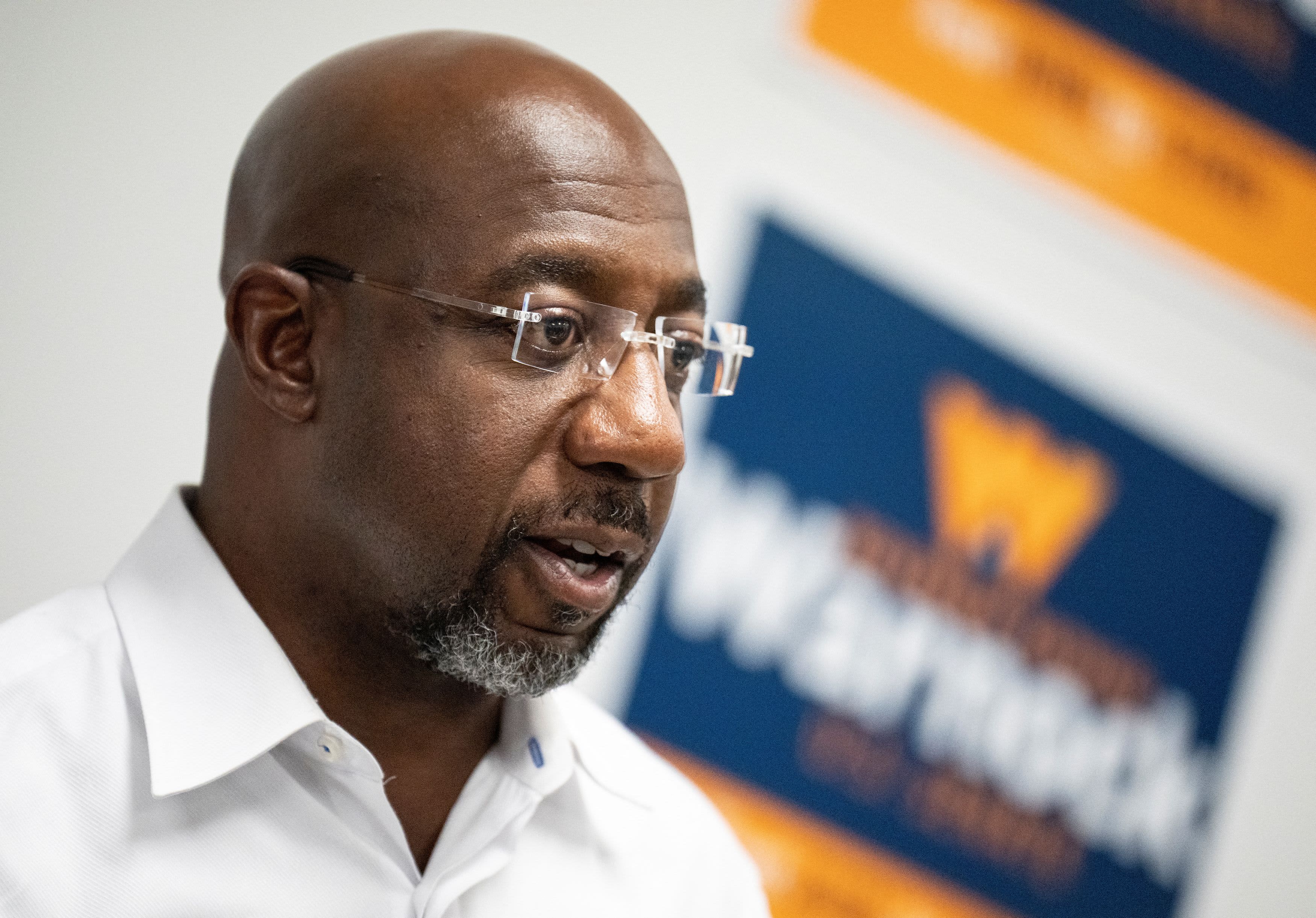
While two million voters already have cast ballots for Georgia's decisive Senate runoff, a drop in early turnout compared to the runoffs two years earlier — as well as hours-long lines at early voting centers — suggests fewer convenient voting options for many Georgians. And the state’s new condensed schedule for the runoff, combined with fewer options to cast ballots ahead of the election, both products of Georgia’s controversial 2021 voting reforms, may be to blame.
This year, the runoff will be held just four weeks after the general election instead of nine, and voters had just one week to cast early ballots in-person instead of the two-plus weeks offered two years ago.
According to figures posted Sunday by Georgia’s Secretary of State:
- 1.86 million voters cast ballots so far for the runoff, down 39% from the 3.1 million voters who cast ballots ahead of the Senate runoffs in January 2021
- 151,016 voters cast absentee/mail ballots ahead of the runoff, down 36% from November’s general election and down 86% from the January 2021 runoff, held during the pandemic
We're making it easier for you to find stories that matter with our new newsletter — The 4Front. Sign up here and get news that is important for you to your inbox.
But Republican Secretary of State Brad Raffensperger pushed back against the idea that voter access was restricted, pointing to the daily records set by voters during Georgia’s condensed early voting window.
Raffensperger said, in a statement last week, that this year’s early voting demand proves "claims of voter suppression in Georgia are conspiracy theories no more valid than Bigfoot."
The 350,000 early votes cast Friday, Dec. 2, four days before the election, were 40% more than any other day in Georgia election history prior to this runoff, according to Raffensperger’s office.
The secretary, who unsuccessfully attempted to further reduce early voting days due to a legal technicality last month, did not acknowledge the reduction in early voting days as a factor in the long lines, particularly at Atlanta-area voting locations.
The crowds at the polls may also be a product of the small number of Georgians voting by mail in the Senate runoff.
Just 9% of the early runoff ballots cast by Georgia voters through Sunday have come via absentee/mail ballot, significantly fewer than other states with long absentee voting traditions, such as Virginia (30% by mail) or Florida (55% by mail), according to elections offices in each state.
Raffensperger has said Georgians simply prefer to vote in person, but some experts say the state’s 2021 election reforms, also known as SB 202, are also affecting the ability of voters to cast ballots by mail.
SB 202 reduced the window for requesting mail ballots, the operating hours for drop boxes, and the number of available drop boxes in the metro Atlanta area.
“We’d likely see shorter lines if voters could have more effectively requested mail ballots,” said Michael McDonald, a political science professor at the University of Florida who tracks early voting turnout. “And the fact that we’re seeing these lines every day – just in certain localities – tells you there’s something systemic going on here.”
McDonald said it’s hard to know how early voting turnout will affect overall turnout and that it was impossible to know how many would-be voters were discouraged enough by mail ballot regulations or long in-person lines to just skip voting early altogether.
“For folks who have hourly jobs [or may] have childcare/family obligations... it's the choice between [not voting] or having their paycheck cut in half for the day,” said Xakota Espinoza with Fair Fight Action, a voter advocacy group founded by Democrat Stacey Abrams.
The truncation of the runoff was one of the least-criticized aspects of SB 202 initially, but it may prove to be one of the most consequential.
How Did Georgia's 2021 Voting Law Reforms Change 2022 Elections?
In some regards, Georgia is one of the easier places to vote in America, with no-excuse absentee voting and early in-person voting, in addition to the options on Election Day.
But SB 202 — which enshrined some pandemic-related conveniences into law, such as early voting on Saturdays — rolled back others that adversely impacted young and urban voters more than older or rural voters.
Included in the reforms:
- shrinking the window for voters to apply for mail ballots
- banning election officials from sending unsolicited absentee applications
- banning the distribution of mail ballots more than four weeks ahead of an election
- banning election offices’ 24/7 drop boxes
- limiting the number of drop boxes a county can offer
- banning mobile voting units
- mandating that counties must have at least 17 early voting days — and up to 19 — for general elections, but just five mandated early voting days for runoffs
- replacing signature affidavits on mail ballots with a voter ID requirement
McDonald tells LX News the changes in law and changes in races on the ballots make it impossible to compare early vote numbers from one runoff to another.
A spokesman for Georgia’s Secretary of State, Brad Raffensperger, told LX News that early turnout for 2022’s general and runoff elections represented “a return to normal,” resembling the early turnout of 2018’s election, which was also held in early December. With no Senate race on that ballot, there was far less attention on Georgia’s 2018 runoff; just 1.45 million voters cast ballots overall.
Raffensperger, as well as Republican Gov. Brian Kemp, have also vigorously championed SB 202, calling it a necessary reform to improve election integrity, confidence and efficiency.
Advocates of the bill say security improvements — such as replacing absentee ballot signature matching with voter ID requirements — reduces fraud, inadvertent ballot rejections and the time it takes election officials to process absentee ballots. Nonpartisan vote watchdog VoteShield says voter ID, in conjunction with other measures, is preferable to signature matching on absentee ballots.
Raffensperger has also said limiting the number of late-arriving mail ballots reduces voter disenfranchisement and that limiting last-minute mail ballots helps election officials produce results faster than most other states.
“It's never been easier to vote in Georgia,” Raffensperger told LX News after the bill passed in 2021. “We wanted to make sure there's appropriate guardrails [and] that we really restored confidence in the absentee ballot process.”
Upon signing SB 202, Kemp said the bill wasn’t about partisan politics, but “protecting the very foundation of who we are as Georgians and Americans.”
He also called for an investigation into 2020’s absentee ballots; that investigation, conducted by the Georgia Bureau of Investigations, found zero cases of fraud.
Effectively Killing Vote-by-Mail
Even more pronounced than the drop in total ballots cast ahead of this year’s runoff has been the drop in ballots cast by mail, accounting for just 9% of all early ballots recorded by state election officials as of Sunday.
The compressed timeline even had many election officials in Georgia discouraging the use of the U.S. mail to deliver ballots, since Georgia is one of the 30 states that won’t count absentee ballots received after Election Day.
But drop boxes are no longer as convenient for Georgia voters either, with SB 202 drastically reducing the number of them available in the state’s most populated and urbanized counties. The law also banned the use of drop boxes in nighttime/early morning hours, as well as anytime within three days of the election.
An Atlanta Journal-Constitution (AJC) analysis found a majority of Atlanta-area residents who voted absentee in 2020 preferred drop boxes to the U.S. Postal Service, but drop box use plummeted the following year after SB 202 limited access.
A New York Times analysis also found that Georgia saw a bigger decrease in mail voting from the 2020 general election to its 2022 general election — 81% — than any other competitive state in the country.
Cobb County Elections Director Janine Eveler told the AJC that voters liked the easy access of 24/7 drop boxes, but “the last weekend and Monday is when they’re needed most, after it becomes too late to mail the ballots.”
Research has found broader access to mail ballots correlates to higher voter turnout rates, and a 2020 LX News/Morning Consult poll found large majorities of Americans cited conveniences such as polling locations, wait times and availability of weekend voting as important factors in determining if they would cast ballots.
“Early voting is overwhelmingly popular among Black and Brown voters, and young voters in particular,” Espinoza of Fair Fight Action said. “Georgia Republicans passed SB 202 to silence their voices and stifle their power.”
Noah Pransky is LX News’ National Political Editor, covering Washington and state politics, with a special focus on young voters. His political and investigative work has been honored with national Murrow, Polk, duPont and Cronkite awards, and you can contact him confidentially at noah.pransky@nbcuni.com, or on Facebook, Instagram or Twitter.



